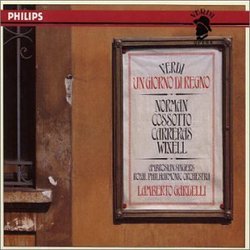| All Artists: Jessye Norman, José Carreras, Ricardo Cassinelli, Fiorenza Cossotto, William Elvin, Wladimiro Ganzarolli, Ambrosian Singers, Vincenzo Sardinero Title: Un Giorno Di Regno Members Wishing: 0 Total Copies: 0 Label: Philips Release Date: 10/19/1989 Genre: Classical Style: Opera & Classical Vocal Number of Discs: 2 SwapaCD Credits: 2 UPC: 028942242920 |
Search - Jessye Norman, José Carreras, Ricardo Cassinelli :: Un Giorno Di Regno
 | Jessye Norman, José Carreras, Ricardo Cassinelli Un Giorno Di Regno Genre: Classical
|
Larger Image |
CD Details |
CD ReviewsGreat Early Verdi with an Enjoyable Performance Matthew Hannigan | New York, NY | 11/12/2002 (5 out of 5 stars) "While this is not necessarily the Verdi most are familiar with, this second opera is still very much an enjoyable Verdian opera. It will not take long to recognize the Rossini influence, however Verdi has polished the style and has made it his own. Being one of only two comedies he composed, it's lighter tones will further differentiate it from what one is accustomed to, but Verdi seems quite comfortable with it. As for the performance, while I've only heard this one, I liked it very much." This is supposed to be Verdi at his worst??? Aram V. Barsamian | Fullerton, CA United States | 09/14/2006 (5 out of 5 stars) "Most opera lovers know that this was Verdi's second opera and first fiasco. The failure of Un giorno di regno hit him so hard that he almost gave up his career as a composer. As reasons for the fiasco we are told that while Verdi was composing this opera buffa, his wife and two children died. It is understandable that someone dealing with such personal tragedy may not be in the best mental state to write a comic opera. And that is all most of us know about this opera. But after hearing this recording, I think it is completely unfair to apologize on Verdi's behalf. Un giorno di regno is absolutely delightful. Sure, it's not hysterically funny, like Rossini's comic operas, but the music is extremely well-crafted. Verdi really did know what he was doing even though he was still in his 20s. Listen to the Marchesa's beautiful big aria in Act II, with its graceful chromaticism, ornamentation and cadenzas. It's gorgeous stuff, almost reminiscent of Bellini. There is plenty of wonderfully energetic music. Perhaps taking his cue from Rossini and La Cenerentola, Verdi wrote TWO wonderful buffo duets (Treasurer/Baron). Many of the pages of Il corsaro, Alzira, Attila and Giovanna d'Arco strike me as uninspired "filler". But I do not get that feeling with Un giorno di regno. I think Verdi did a great job... mostly... Bless his heart, he did not quite know the capabilities of the human voice yet. The soprano roles are actually quite low, with the Marchesa regularly dipping down to low Cs, Bs and As. The soprano lead in Verdi's first opera, Oberto, also descends below the staff on a regular basis. The men's roles, however are all very high. Verdi did not write many high Cs for his tenors. I can think of one case in which Verdi asks his tenors to sing a high C: Otello ("cortigiaaaaaNA!") and a high D: I vespri siciliani. But here Verdi asks the tenor to sing a high C and hold it (in the act II aria). All three of the bass/baritone buffos regularly ascend to high Es, Fs and F-sharps. Now, the performance. It's marvelous. First of all, Fiorenza Cossotto is just perfect as the Marchesa. Beautiful tone, personality, coloratura, high notes, low notes -- she's got it all. Not a single note is strained or forced. Jessye Norman is quite obviously out of her element here. Much of what she does is lovely and cute, but when surrounded by the likes of Cossotto and Carreras, it becomes apparent that she is simply not very idiomatic here. The Italian is not good, especially in recitatives. Her intonation is sometimes off. But one can hear that she is an intelligent singing actress. Carreras is heavenly. In 1974 he was at the beginning of his career and the voice is handsome, full, unforced and soaring. The high C I mentioned earlier is magnificent! Ingvar Wixell does a great job as well. His voice is resonant, full of color and his delivery is appropriately humorous. He handles the high tessitura of his aria very skillfully. Vicente Sardinero was, I think, a very underrated artist. He had a glorious baritone, well displayed on the recording of Puccini's second opera, Edgar. Here he is the Treasurer and sings beautifully. Vladimiro Ganzarolli is the Baron. Gorgeous bass! He also handles the high tessitura wonderfully and infuses his delivery with great comic colors. You just can't lose with this recording. The music is delightful -- a real testament to what Verdi was capable of, even in the worst of circumstances. This opera really needs no apology. The performances are great. The price is low. There is just no down-side. Get it and let us know what you think of it." THIS OPERA IS GREAT Mario Gonzalez Dorado | 08/27/2003 (5 out of 5 stars) "If you want to know what joy of singing is, try listening to this opera. It's really great. Terrific. You'll find joy in it, and you'll never think you've lost your money because you've bought it."
|

 Track Listings (16) - Disc #1
Track Listings (16) - Disc #1